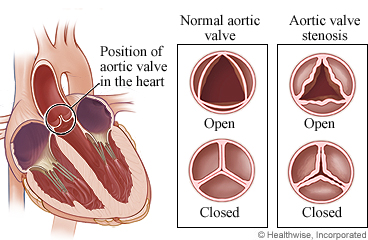
Overview
Having aortic valve stenosis means that the valve between your heart and the large blood vessel that carries blood to the body (aorta) has narrowed. That forces the heart to pump harder to get enough blood through the valve. As stenosis gets worse, the valve gets narrower. This can cause symptoms. Symptoms include chest pain, dizziness, fainting, or shortness of breath.
Your doctor will check your heart regularly. You may take medicine to lower blood pressure or cholesterol. If the stenosis gets worse, you may choose to have the valve replaced.
Follow-up care is a key part of your treatment and safety. Be sure to make and go to all appointments, and call your doctor if you are having problems. It's also a good idea to know your test results and keep a list of the medicines you take.
How can you care for yourself at home?
- Be safe with medicines. Take your medicines exactly as prescribed. Call your doctor if you think you are having a problem with your medicine.
- Call your doctor if you have new symptoms or your symptoms get worse.
- Eat heart-healthy foods. These include vegetables, fruits, nuts, beans, lean meat, fish, and whole grains. Limit sodium, alcohol, and sugar.
- Be active. Ask your doctor what type and level of exercise is safe for you.
- Do not smoke.
- Stay at a healthy weight. Lose weight if you need to.
- Manage other health problems. If you think you may have a problem with alcohol or drug use, talk to your doctor.
- Get vaccinated against COVID-19, the flu, and pneumonia.
- Take care of your teeth and gums. Get regular dental checkups. Good dental health is important because bacteria can spread from infected teeth and gums to the heart valves.
When should you call for help?
Call 911 anytime you think you may need emergency care. For example, call if:
- You passed out (lost consciousness).
- You have symptoms of a heart attack. These may include:
- Chest pain or pressure, or a strange feeling in the chest.
- Sweating.
- Shortness of breath.
- Nausea or vomiting.
- Pain, pressure, or a strange feeling in the back, neck, jaw, or upper belly or in one or both shoulders or arms.
- Lightheadedness or sudden weakness.
- A fast or irregular heartbeat.
After you call 911, the operator may tell you to chew 1 adult-strength or 2 to 4 low-dose aspirin. Wait for an ambulance. Do not try to drive yourself.
Call your doctor now or seek immediate medical care if:
- You have new symptoms or your symptoms get worse.
- You have new or increased shortness of breath.
- You are dizzy or lightheaded, or you feel like you may faint.
- You have sudden weight gain, such as more than 2 to 3 pounds in a day or 5 pounds in a week. (Your doctor may suggest a different range of weight gain.)
- You have new or increased swelling in your legs, ankles, or feet.
- You are suddenly so tired or weak that you cannot do your usual activities.
Watch closely for changes in your health, and be sure to contact your doctor if you have any problems.
Where can you learn more?
Go to http://www.healthwise.net/patientEd
Enter L898 in the search box to learn more about "Aortic Valve Stenosis: Care Instructions".
Current as of: June 24, 2023
Author: Healthwise Staff
Clinical Review Board
All Healthwise education is reviewed by a team that includes physicians, nurses, advanced practitioners, registered dieticians, and other healthcare professionals.

